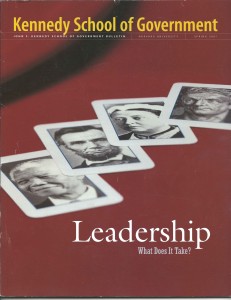 The greatness of leadership does not depend on position, and a great position does not guarantee a great leader. Leadership is grounded in others, not self. It gives to get the best from others. It inspires by commitment and example, not by exhortation.lt is larger than the leader. It inspires and aspires for the greater good.
The greatness of leadership does not depend on position, and a great position does not guarantee a great leader. Leadership is grounded in others, not self. It gives to get the best from others. It inspires by commitment and example, not by exhortation.lt is larger than the leader. It inspires and aspires for the greater good.
What makes a leader a leader? In my life I’ve been fortunate to have been inspired by many leaders, but most moved by three: an urban civil rights leader; a national leader, constantly in the public eye; and a community/family leader. While their milieus differed dramatically, how they led and the principles on which they led were stunningly similar and a manifestation of the very best in all of us.
Father Washington was an amazing person. It wasn’t until years later when I assumed my own leadership positions that I realized just how amazing he really was. He served as rector of the Church of the Advocate, a church that stood in the midst of Philadelphia’s greatest poverty and violence. The church exploded with political activity, as the civil rights movement had just begun: SNCC (Student Non-Violent Coordinating Committee), CORE (Congress of Racial Equality), and OIC (Opportunities Industrialization Corps) met frequently in the church. Marches, freedom rides, and picket lines for fair housing poured out of the church. I remember his eyes. He filled his eyes with you. Chaos outside, political activity a constant, an urban summer camp of 1,000 boisterous kids (which I, as a young seminarian, ran). Yet when you spoke to him, you were the only one. He elicited the best in you. Philadelphia gave Father Washington its top civic award a few years ago. He would have been the last to ask for it. He was a dazzling and rare combination: attendant to the structure and attendant to the human. Highly personal and highly political. Justice and charity. Caring and changing structures to abet caring. His moral commitments altered the language of those who controlled the structure. He left a changed city – new laws, regulations, housing for the poor, job-training programs- and he also left changed people. His authority transcended his clerical robes.
So too with Janet Reno, whose formal authority as U.S. attorney general never defined her. She was bigger than her title, and I have watched her work for seven years. I sit on her Coordinating Council on Juvenile Justice and have been on many panels with her. On one occasion we couldn’t find her; she was in the back of the room talking to kids, making notes on three-by-five cards, asking questions. No staff, just Janet Reno and teenagers. We helped her start the Youth Network, a network made up of all kinds of youth from honor society students to former gang members, whom she actually telephoned to ask about policy.”What would you do if you were me?” she’d ask them.
Had Reno’s title defined her, the job would have broken her, or she would have been less and done less. She made every effort amidst the fervor and controversy of Waco, Oklahoma City, Elian Gonzalez, and Monica Lewinsky to do justice. But we also know her as the single most effective child advocate in Clinton’s cabinet, a woman who pioneered the concept of crime prevention as developing healthy families and healthy communities that don’t produce crime. Crime dropped every year during her tenure.
Larry Brendtro, a fellow member of the Coordinating Council, told her that he saw her picture on the wall of a poor family on an Indian reservation in North Dakota. Reno turned to him and said delightedly, “I remember the conversation.” She also recalled the young boy by name. Justice and charity. The law and the human face.
The arenas of home and community also demand extra- ordinary leaders. As kids, we didn’t care that our mother, Fordham Calhoun, was president of her 1929 Radcliffe class. Some leaders gain stature by making others smaller. She did the reverse. In her presence you grew. She set her standards very high; yet she made you feel you were the world’s most loved and competent person. She was a civic-minded person who tackled many of the com- munity’s tasks and was the first to feed and even put up those who had no place to stay.
As she aged, she became unable to care for herself and entered a retirement home. Soon thereafter she started the Shakespeare reading group. She discovered, now in a wheelchair, that it was almost impossible for her and others in similarly frail condition to open the large, heavy fire doors separating the wings. After a considerable effort, she was able to mobilize the residents and retirement home staff, to get the owners up from Washington to hear the petitions to have doors installed. She was to have co-chaired the meeting with the executives, but she didn’t show. The room was packed with residents, the retirement home staff, and the investors who began without her. Half an hour into the meeting, my mother rolled in with a smile on her face and said, “Sorry I’m late, I got stuck in one of the doors.” Automatic doors were installed.
Many of the elderly suffered accidents or near accidents as they drove out to shop. She asked that a traffic light be installed. The highway traffic system said that the number of vehicles didn’t jus- a traffic light. She asked them how they justified it. They said, “We do a count.”She persuaded them to count. She found out what day they planned to install the black rubber counter across the road. After it was installed, she persuaded the residents to shop more inefficiently than they had ever shopped – to drive out and buy eggs, turn around, come back, and an hour later go out and buy milk, and then a few hours later, go out and buy coffee. The high traffic count soon produced a traffic light.
My mother found some- thing in everyone in which she could exult, similar to Albert Einstein, as noted by the British philosopher Alfred Ayre who wrote, “One thing I remember continues to be my regarding him as the greatest man I ever met, and that was his talking to me, a very young man of no importance, as though he could learn something from me.” My mother lived a paradox. Like Einstein, she was full because she gave so much away.
All three of these leaders did important work and hard work. They invested work with meaning. There was joy in the work. They risked listening, risked challenges to their authority. You wanted to be around their beliefs and their effectiveness; you wanted to be around them.
They were busy. They faced challenges, some huge, some smaller, but one never felt that events shaped them. They created trust. Those who followed them believed in their work and they believed in themselves. These leaders gave us the best in ourselves. We risked working with these leaders for we were trusted, and we knew that, by virtue of who they were, our work would involve both justice and charity.
John Calhoun KSGP 1980, MPA 1986 is the founding chief executive of the National Crime Prevention Council, a 20-year-old Washington, DC-based nonprofit whose mission is to build safe and caring communities. He also founded Justice Resource Institute, an agency that pioneered diversion and restorative justice initiatives in Massachusetts, and served as commissioner of youth services under former Governor Dukakis. He was appointed by President Carter to head the Administration for Children, Youth, and Families, which oversaw such programs as Head Start, Child Welfare and Child Abuse Prevention. In addition to a degree from the Kennedy School, Calhoun earned a BA from Brown University, a master’s in divinity from the Episcopal Theological School, and served as a KSG fellow.
*First published in the Spring 2001 edition of the Harvard University John F. Kennedy School of Government Bulletin.



Leave a Reply